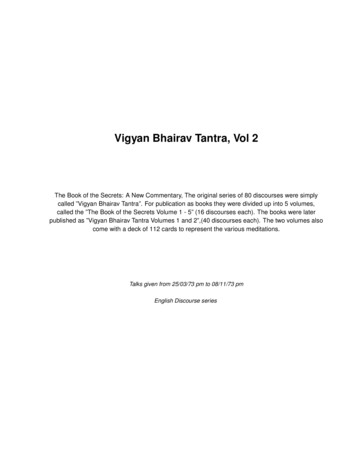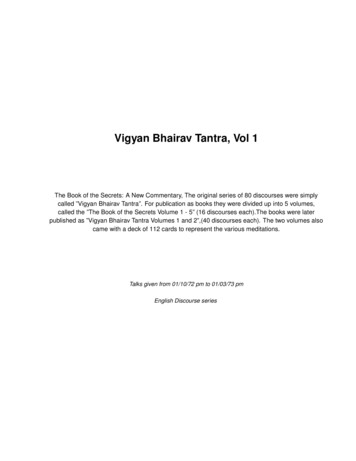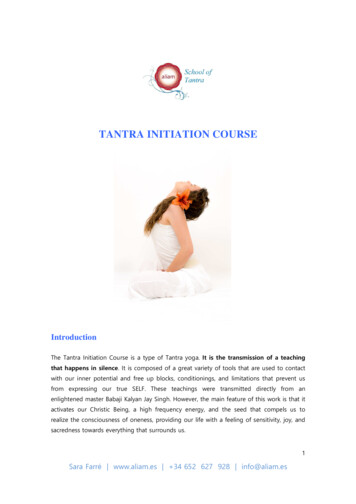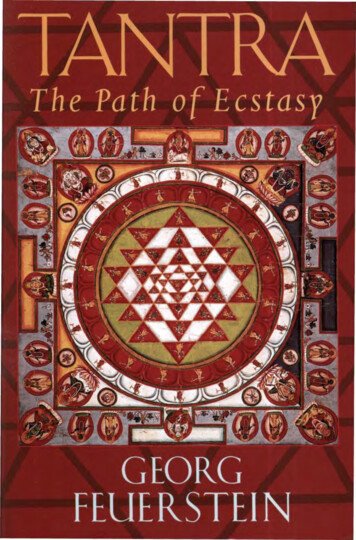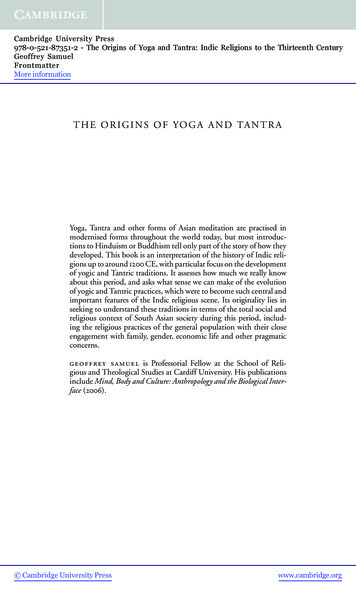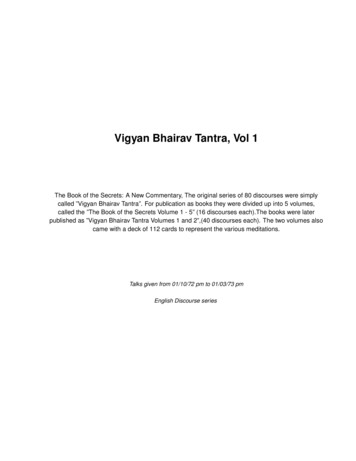
Transcription
Vigyan Bhairav Tantra, Vol 1The Book of the Secrets: A New Commentary, The original series of 80 discourses were simplycalled ”Vigyan Bhairav Tantra”. For publication as books they were divided up into 5 volumes,called the ”The Book of the Secrets Volume 1 - 5” (16 discourses each).The books were laterpublished as ”Vigyan Bhairav Tantra Volumes 1 and 2”,(40 discourses each). The two volumes alsocame with a deck of 112 cards to represent the various meditations.Talks given from 01/10/72 pm to 01/03/73 pmEnglish Discourse series
CHAPTER 1The World of Tantra1 October 1972 pm in Woodlands, BombaySUTRA:DEVI ASKS:OH SHIVA, WHAT IS YOUR REALITY?WHAT IS THIS WONDER-FILLED UNIVERSE?WHAT CONSTITUTES SEED?WHO CENTERS THE UNIVERSAL WHEEL?WHAT IS THIS LIFE BEYOND FORM PERVADING FORMS?HOW MAY WE ENTER IT FULLY, ABOVE SPACE AND TIME, NAMES AND DESCRIPTIONS?LET MY DOUBTS BE CLEARED!Some introductory points. First, the world of VIGYANA BHAIRAVA TANTRA is not intellectual, itis not philosophical. Doctrine is meaningless to it. It is concerned with method, with technique– not with principles at all. The word ‘tantra’ means technique, the method, the path. So it isnot philosophical – note this. It is not concerned with intellectual problems and inquiries. It is notconcerned with the ”why” of things, it is concerned with ”how”; not with what is truth, but how thetruth can be attained.2
CHAPTER 1. THE WORLD OF TANTRATANTRA means technique. So this treatise is a scientific one. Science is not concerned withwhy, science is concerned with how. That is the basic difference between philosophy and science.Philosophy asks, ”Why this existence?” Science asks, ”How this existence?” The moment youask the question, how?, method, technique, become important. Theories become meaningless;experience becomes the center.Tantra is science, tantra is not philosophy. To understand philosophy is easy because only yourintellect is required. If you can understand language, if you can understand concept, you canunderstand philosophy. You need not change; you require no transformation. As you are, youcan understand philosophy – but not tantra.You will need a change. rather, a mutation. Unless YOU are different tantra cannot be understood,because tantra is not an intellectual proposition, it is an experience. Unless you are receptive, ready,vulnerable to the experience, it is not going to come to you.Philosophy is concerned with the mind. Your head is enough; your totality is not required. Tantraneeds you in your totality. It is a deeper challenge. You will have to be in it wholly. It is notfragmentary. A different approach, a different attitude, a different mind to receive it is required.Because of this, Devi is asking apparently philosophical questions. Tantra starts with Devi’squestions. All the questions can be tackled philosophically.Really, any question can be tackled in two ways: philosophically or totally, intellectually orexistentially. For example, if someone asks, ”What is love?” you can tackle it intellectually, youcan discuss, you can propose theories, you can argue for a particular hypothesis. You can create asystem, a doctrine – and you may not have known love at all.To create a doctrine, experience is not needed. Really, on the contrary, the less you know the betterbecause then you can propose a system unhesitatingly. Only a blind man can easily define whatlight is. When you do not know you are bold. Ignorance is always bold; knowledge hesitates. Andthe more you know, the more you feel that the ground underneath is dissolving. The more you know,the more you feel how ignorant you are. And those who are really wise, they become ignorant. Theybecome as simple as children, or as simple as idiots.The less you know, the better. To be philosophical, to be dogmatic, to be doctrinaire – this is easy.To tackle a problem intellectually is very easy. But to tackle a problem existentially – not just to thinkabout it, but to live it through, to go through it, to allow yourself to be transformed through it – isdifficult. That is, to know love one will have to be in love. That is dangerous because you will notremain the same. The experience is going to change you. The moment you enter love, you enter adifferent person. And when you come out you will not be able to recognize your old face; it will notbelong to you. A discontinuity will have happened. Now there is a gap, the old man is dead and thenew man has come. That is what is known as rebirth – being twice-born.Tantra is non-philosophical and existential. So of course Devi asks questions which appear to bephilosophical, but Shiva is not going to answer them that way. So it is better to understand it in thebeginning; otherwise you will be puzzled, because Shiva is not going to answer a single question.All the questions that Devi is asking, Shiva is not going to answer at all. And still he answers! Andreally, only he has answered them and no one else – but on a different plane.Vigyan Bhairav Tantra, Vol 13Osho
CHAPTER 1. THE WORLD OF TANTRADevi asks, ”What is your reality, my lord?” He is not going to answer it. On the contrary, he will givea technique. And if Devi goes through this technique, she will know. So the answer is round-about;it is not direct. He is not going to answer ”Who am I.” He will give a technique – do it and you willknow.For tantra, doing is knowing, and there is no other knowing. Unless you do something, unless youchange, unless you have a different perspective to look at, to look with, unless you move in analtogether different dimension than the intellect, there is no answer. Answers can be given – theyare all lies. All philosophies are lies. You ask a question and the philosophy gives you an answer. Itsatisfies you or doesn’t satisfy you. If it satisfies you, you become a convert to the philosophy, butyou remain the same. If it doesn’t satisfy you, you go on searching for some other philosophy to beconverted to. But you remain the same; you are not touched at all, you are not changed.So whether you are a Hindu or a Mohammedan or a Christian or a Jain, it makes no difference. Thereal person behind the facade of a Hindu or a Mohammedan or a Christian is the same. Only wordsdiffer, or clothes. The man who is going to the church or to the temple or to the mosque is the sameman. Only faces differ, and they are faces which are false; they are masks. Behind the masks youwill find the same man – the same anger, the same aggression, the same violence, the same greed,the same lust – everything the same. Is Mohammedan sexuality different from Hindu sexuality? IsChristian violence different from Hindu violence? It is the same! The reality remains the same; onlyclothes differ.Tantra is not concerned with your clothes, tantra is concerned with you. If you ask a question itshows where you are. It shows also that wherever you are you cannot see; that is why there is thequestion. A blind man asks, ”What is light?” and philosophy will start answering what is light. Tantrawill know only this: if a man is asking ”What is light?” it shows only that he is blind. Tantra will startoperating on the man, changing the man, so that he can see. Tantra will not say what is light. Tantrawill tell how to attain insight, how to attain seeing, how to attain vision. When the vision is there, theanswer will be there. Tantra will not give you the answer; tantra will give you the technique to attainthe answer.Now, this answer is not going to be intellectual. If you say something about light to a blind man, thisis intellectual. If the blind man himself becomes capable of seeing, this is existential. This is what Imean when I say that tantra is existential. So Shiva is not going to answer Devi’s questions, still, hewill answer – the first thing.The second thing: this is a different type of language. You must know something about it beforewe enter into it. All the tantra treatises are dialogues between Shiva and Devi. Devi questions andShiva answers. All the tantra treatises start that way. Why? Why this method? It is very significant.It is not a dialogue between a teacher and a disciple, it is a dialogue between two lovers. And tantrasignifies through it a very meaningful thing: that the deeper teachings cannot be given unless thereis love between the two – the disciple and the master. The disciple and master must become deeplovers. Only then can the higher, the beyond, be expressed.So it is a language of love; the disciple must be in an attitude of love. But not only this, becausefriends can be lovers. Tantra says a disciple moves as receptivity, so the disciple must be in afeminine receptivity; only then is something possible. You need not be a woman to be a disciple, butVigyan Bhairav Tantra, Vol 14Osho
CHAPTER 1. THE WORLD OF TANTRAyou need to be in a feminine attitude of receptivity. When Devi asks, it means the feminine attitudeasks. Why this emphasis on the feminine attitude?Man and woman are not only physically different, they are psychologically different. Sex is not onlya difference in the body; it is a difference in psychologies also. A feminine mind means receptivity– total receptivity, surrender, love. A disciple needs a feminine psychology; otherwise he will not beable to learn. You can ask, but if you are not open then you cannot be answered. You can ask aquestion and still remain closed. Then the answer cannot penetrate you. Your doors are closed; youare dead. You are not open.A feminine receptivity means a womb-like receptivity in the inner depth, so that you can receive.And not only that – much more is implied. A woman is not only receiving something, the momentshe receives it, it becomes a part of her body. A child is received. A woman conceives; the momentthere is conception, the child has become part of the feminine body. It is not alien, it is not foreign. Ithas been absorbed. Now the child will live not as something added to the mother, but just as a part,just as the mother. And the child is not only received: the feminine body becomes creative; the childbegins to grow.A disciple needs a womb-like receptivity. Whatsoever is received is not to be gathered as deadknowledge. It must grow in you; it must become blood and bones in you. It must become a part,now. It must grow! This growth will change you, will transform you – the receiver. That is why tantrauses this device. Every treatise starts with Devi asking a question and Shiva replying to it. Devi isShiva’s consort, his feminine part.One thing more. Now modern psychology, depth psychology particularly, says that man is bothman and woman. No one is just male and no one is just female; everyone is bi-sexual. Bothsexes are there. This is a very recent research in the West, but for tantra this has been one ofthe most basic concepts for thousands of years. You must have seen some pictures of Shiva asARDHANARISHWAR – half man, half woman. There is no other concept like it in the whole historyof man. Shiva is depicted as half man, half woman.So Devi is not just a consort, she is Shiva’s other half. And unless a disciple becomes the otherhalf of the master it is impossible to convey the higher teachings, the esoteric methods. When youbecome one then there is no doubt. When you are one with the master – so totally one, so deeplyone – there is no argument, no logic, no reason. One simply absorbs; one becomes a womb. Andthen the teaching begins to grow in you and change you.That is why tantra is written in love language. Something must also be understood about lovelanguage. There are two types of language: logical language and love language. There are basicdifferences between the two.Logical language is aggressive, argumentative, violent. If I use logical language I becomeaggressive upon your mind. I try to convince you, to convert you, to make a puppet of you. Myargument is ”right” and you are ”wrong.” Logical language is egocentric: ”I am right and you arewrong, so I must prove that I am right and you are wrong.” I am not concerned with you, I amconcerned with my ego. My ego is always ”right.”Vigyan Bhairav Tantra, Vol 15Osho
CHAPTER 1. THE WORLD OF TANTRALove language is totally different. I am not concerned with my ego; I am concerned with you. Iam not concerned to prove something, to strengthen my ego. I am concerned to help you. It is acompassion to help you to grow, to help you to transform, to help you to be reborn.Secondly, logic will always be intellectual. Concepts and principles will be significant, argumentswill be significant. With love language what is said is not so significant; rather, it is the way it issaid. The container, the word is not important; the content, the message is more important. It is aheart-to-heart talk, not a mind-to-mind discussion. It is not a debate, it is a communion.So this is rare: Devi is sitting in the lap of Shiva and asking, and Shiva answers. It is a love dialogue –no conflict, as if Shiva is speaking to himself. Why this emphasis on love – love language? Becauseif you are in love with your master, then the whole gestalt changes; it becomes different. Then youare not hearing his words. Then you are drinking him. Then words are irrelevant. Really, the silencebetween the words becomes more significant. What he is saying may be meaningful or it may notbe meaningful. but it is his eyes, his gestures, his compassion, his love.That is why tantra has a fixed device, a structure. Every treatise starts with Devi asking andShiva answering. No argument is going to be there, no wastage of words. There are very simplestatements of fact, telegraphic messages with no view to convince, but just to relate.If you encounter Shiva with a question with a closed mind, he will not answer you in this way. Firstyour closedness has to be broken. Then he will have to be aggressive. Then your prejudices, thenyour preconceptions have to be destroyed. Unless you are cleared completely of your past, nothingcan be given to you. But this is not so with his consort Devi; with Devi there is no past.Remember, when you are deeply in love your mind ceases to be. There is no past; only the presentmoment becomes everything. When you are in love the present is the only time, the now is all – nopast, no future. So Devi is just open. There is no defense – nothing to be cleared, nothing to bedestroyed. The ground is ready, only a seed has to be dropped. The ground is not only ready, butwelcoming, receptive, asking to be impregnated.So all these sayings that we are going to discuss will be telegraphic. They are just sutras, but eachsutra, each telegraphic message given by Shiva is worth a Veda, worth a Bible, worth a Koran.Each single sentence can become the base of a great scripture. Scriptures are logical – you haveto propose, defend, argue. Here there is no argument, just simple statements of love.Thirdly, the very words VIGYANA BHAIRAVA TANTRA mean the technique of going beyondconsciousness. VIGYANA means consciousness, BHAIRAVA means the state which is beyondconsciousness, and TANTRA means the method: the method of going beyond consciousness. Thisis the supreme doctrine – without any doctrine.We are unconscious, so all the religious teachings are concerned with how to go beyondunconsciousness, how to be conscious. For example, Krishnamurti, Zen, they are all concernedwith how to create more consciousness, because we are unconscious. So how to be more aware,alert? From unconsciousness, how to move toward consciousness?But tantra says that this is a duality – unconscious and conscious. If you move from unconsciousnessto consciousness, you are moving from one duality to another. Move beyond both! Unless you moveVigyan Bhairav Tantra, Vol 16Osho
CHAPTER 1. THE WORLD OF TANTRAbeyond both you can never reach the ultimate, so be neither the unconscious nor the conscious; justgo beyond, just be. Be neither the conscious nor the unconscious – just BE! This is going beyondyoga, going beyond Zen, going beyond all teachings.’Vigyana’ means consciousness, and ’bhairava’ is a specific term, a tantra term for one who hasgone beyond. That is why Shiva is known as Bhairava and Devi is known as Bhairavi – those whohave gone beyond the dualities.In our experience only love can give a glimpse. That is why love becomes the very basic device toimpart tantric wisdom. In our experience we can say that only love is something which goes beyondduality. When two persons are in love, the deeper they move into it, the less and less they aretwo, the more and more they become one. And a point comes and a peak is reached when onlyapparently they are two. Inwardly they are one; the duality is transcended.Only in this sense does Jesus’ saying that ”God is love” become meaningful; otherwise not. In ourexperience love is nearest to God. It is not that God is loving, as Christians go on interpreting – thatGod has a fatherly love for you. Nonsense! ”God is love” is a tantric statement. It means love is theonly reality in our experience which reaches nearest to God, to the divine. Why? Because in loveoneness is felt. Bodies remain two, but something beyond the bodies merges and becomes one.That is why there is so much hankering after sex. The real hankering is after oneness, but thatoneness is not sexual. In sex two bodies have only a deceptive feeling of becoming one, but theyare not one, they are only joined together. But for a single moment two bodies forget themselvesin each other, and a certain physical oneness is felt. This hankering is not bad, but to stop at it isdangerous. This hankering shows a deeper urge to feel oneness.In love, on a higher plane, the inner one moves, merges into the other, and there is a feeling ofoneness. Duality dissolves. Only in this non-dual love can we have a glimpse of what is the state ofa Bhairava. We may say that the state of a Bhairava is absolute love with no coming back, from thepeak of love there is no falling back. It is remaining on the peak.We have made Shiva’s abode on Kailash. That is simply symbolic: it is the highest peak, the holiestpeak. We have made it Shiva’s abode. We can go there but we will have to come down, it cannotbe our abode. We can go on a pilgrimage. It is a TEERTHYATRA – a pilgrimage, a journey. We cantouch for a single moment the highest peak; then we will have to come back.In love this holy pilgrimage happens, but not for all because almost no one moves beyond sex. Sowe go on living in the valley, the dark valley. Sometimes someone moves to the peak of love, butthen he falls back because it is so dizzying. It is so high and you are so low,. and it is so difficult tolive there. Those who have loved, they know how difficult it is to be constantly in love. One has tocome back again and again. It is Shiva’s abode. He lives there; it is his home.A Bhairava lives in love; that is his abode. When I say that is his abode, I mean now he is not evenaware of love – because if you live on Kailash you will not be aware that this is Kailash, this is apeak. The peak becomes a plain. Shiva is not aware of love. We are aware of love because we livein non-love. And because of the contrast we feel love. Shiva IS love. The state of Bhairava meansthat one has become love, not loving; one has become LOVE, one lives on the peak. The peak hasbecome his abode.Vigyan Bhairav Tantra, Vol 17Osho
CHAPTER 1. THE WORLD OF TANTRAHow to make this highest peak possible: beyond duality, beyond unconsciousness, beyondconsciousness, beyond the body and beyond the soul, beyond the world and beyond the so-calledMOKSHA – liberation? How to reach this peak? The technique is tantra. But tantra is puretechnique, so it is going to be difficult to understand. First let us understand the questions, whatDevi is asking.OH SHIVA, WHAT IS YOUR REALITY? Why this question? You can also ask this question, but it willnot carry the same meaning. So try to understand why Devi asks, WHAT IS YOUR REALITY? Deviis in deep love. When you are in deep love, for the first time you encounter the inner reality. ThenShiva is not the form, then Shiva is not the body. When you are in love, the body of the beloved fallsaway, disappears. The form is no more and the formless is revealed. You are facing an abyss. Thatis why we are so afraid of love. We can face a body, we can face a face, we can face a form, but weare afraid of facing an abyss.If you love someone, if you really love, his body is bound to disappear. In some moments of climax,of peak, the form will dissolve, and through the beloved you will enter the formless. That is why weare afraid – it is falling into a bottomless abyss. So this question is not just a simple curiosity: OHSHIVA, WHAT IS YOUR REALITY?Devi must have fallen in love with the form. Things start that way. She must have loved this manas a man, and now when the love has come of age, when the love has flowered, this man hasdisappeared. He has become formless. Now he is to be found nowhere. OH SHIVA, WHAT ISYOUR REALITY? It is a question asked in a very intense love moment. And when questions areraised, they become different according to the mind in which they are asked.So create the situation, the milieu of the question in your mind. Devi must be at a loss – Shivahas disappeared. When love reaches its peak the lover disappears. Why does this happen? Thishappens because really, everyone is formless. You are not a body. You move as a body, you liveas a body, but you are not a body. When we see someone from the outside, he is a body. Lovepenetrates within. Then we are not seeing the person from the outside. Love can see a person asthe person can see himself from within. Then the form disappears.A Zen monk, Rinzai, attained his enlightenment, and the first thing he asked was, ”Where is mybody? Where has my body gone?” And he began to search. He called his disciples and said, ”Goand find out where my body is. I have lost my body.”He had entered the formless. You are also a formless existence, but you know yourself not directly,but from others’ eyes. You know through the mirror. Sometime, while looking in the mirror, closeyour eyes and then think, meditate: if there was no mirror, how could you have known your face? Ifthere was no mirror, there would have been no face. You do not have a face; mirrors give you faces.Think of a world where there are no mirrors. You are alone – no mirror at all, not even others’ eyesworking as mirrors. You are alone on a lonely island; nothing can mirror you. Then will you haveany face? Or will you have any body? You cannot have one. You do not have one at all. We knowourselves only through others, and the others can only know the outer form. That is why we becomeidentified with it.Another Zen mystic, Hui-Hai used to say to his disciples, ”When you have lost your head meditating,come immediately to me. When you lose your head, come immediately to me. When you begin toVigyan Bhairav Tantra, Vol 18Osho
CHAPTER 1. THE WORLD OF TANTRAfeel there is no head, do not be afraid; come immediately to me. This is the right moment. Nowsomething can be taught to you.” With a head, no teaching is possible. The head always comes inbetween.Devi asks Shiva, OH SHIVA, WHAT IS YOUR REALITY? – who are you? The form has disappeared;hence the question. In love you enter the other as himself. It is not you answering. You becomeone, and for the first time you know an abyss – a formless presence.That is why for centuries together, centuries and centuries, we were not making any sculptures,any pictures of Shiva. We were only making SHIVALINGA – the symbol. The Shivalinga is just aformless form. When you love someone, when you enter someone, he becomes just a luminouspresence. The Shivalinga is just a luminous presence, just an aura of light.That is why Devi asks, WHAT IS YOUR REALITY?WHAT IS THIS WONDER-FILLED UNIVERSE? We know the universe, but we never know it aswonder-filled. Children know, lovers know. Sometimes poets and madmen know. We do not knowthat the world is wonder-filled. Everything is just repetitive – no wonder, no poetry, just flat prose.It doesn’t create a song in you; it doesn’t create a dance in you; it doesn’t give birth to the poetryinside. The whole universe looks mechanical. Children look at it with wonder-filled eyes. When theeyes are wonder-filled, the universe is wonder-filled.When you are in love, you again become like children. Jesus says, ”Only those who are like childrenwill enter my kingdom of God.” Why? Because if the universe is not a wonder, you cannot bereligious. The universe can be explained – then your approach is scientific. The universe is eitherknown or unknown, but that which is unknown can be known any day; it is not unknowable. Theuniverse becomes unknowable, a mystery, only when your eyes are wonder-filled.Devi says, WHAT IS THIS WONDER-FILLED UNIVERSE? Suddenly there is the jump from apersonal question to a very impersonal one. She was asking, WHAT IS YOUR REALITY? andthen suddenly, WHAT IS THIS WONDER-FILLED UNIVERSE?When form disappears, your beloved becomes the universe, the formless, the infinite. SuddenlyDevi becomes aware that she is not asking a question about Shiva; she is asking a question aboutthe whole universe. Now Shiva has become the whole universe. Now all the stars are moving in him,and the whole firmament and the whole space is surrounded by him. Now he is the great engulfingfactor – ”the great encompassing.” Karl Jaspers has defined God as ”the great encompassing.”When you enter into love, into a deep, intimate world of love, the person disappears, the formdisappears, and the lover becomes just a door to the universe. Your curiosity can be a scientific one– then you have to approach through logic. Then you must not think of the formless. Then bewareof the formless; then remain content with the form. Science is always concerned with the form. Ifanything formless is proposed to a scientific mind, he will cut it into form – unless it takes a form it ismeaningless. First give it a form, a definite form; only then does the inquiry start.In love, if there is form then there is no end to it. Dissolve the form! When things become formless,dizzy, without boundaries, every thing entering another, the whole universe becoming a oneness,then only is it a wonder-filled universe.Vigyan Bhairav Tantra, Vol 19Osho
CHAPTER 1. THE WORLD OF TANTRAWHAT CONSTITUTES SEED? Then Devi goes on. From the universe she goes on to ask, WHATCONSTITUTES SEED? This formless, wonder-filled universe, from where does it come? Fromwhere does it originate? Or does it NOT originate? What is the seed?WHO CENTERS THE UNIVERSAL WHEEL? asks Devi. This wheel goes on moving and moving –this great change, this constant flux. But who centers this wheel? Where is the axis, the center, theunmoving center?She doesn’t stop for any answer. She goes on asking as if she is not asking anyone, as if talking toherself.WHAT IS THIS LIFE BEYOND FORM PERVADING FORMS?HOW MAY WE ENTER IT FULLY, ABOVE SPACE AND TIME, NAMES AND DESCRIPTION?LET MY DOUBTS BE CLEARED. The emphasis is not on questions but on doubts: LET MYDOUBTS BE CLEARED! This is very significant. If you are asking an intellectual question, youare asking for a definite answer so that your problem is solved. But Devi says, LET MY DOUBTSBE CLEARED. She is not really asking about answers. She is asking for a transformation of hermind, because a doubting mind will remain a doubting mind whatsoever answers are given. Note it:a doubting mind will remain a doubting mind. Answers are irrelevant. If I give you one answer andyou have a doubting mind, you will doubt it. If I give you another answer, you will doubt that also.You have a doubting mind. A doubting mind means you will put a question mark to anything.So answers are useless. You ask me, ”Who created the world?” and I tell you ”A” created the world.Then you are bound to ask, ”Who created ’A’?” So the real problem is not how to answer questions.The real problem is how to change the doubting mind, how to create a mind which is not doubting –or, which is trustful. So Devi says, LET MY DOUBTS BE CLEARED.Two or three things more. When you ask a question, you may be asking for many reasons. Onemay be just this, that you want a confirmation. You already know the answer, you have the answer,you just want it to be confirmed that your answer is right. Then your question is false, pseudo; it isnot a question. You may be asking a question not because you are ready to change yourself, butjust as a curiosity.The mind goes on questioning. In the mind questions come as leaves come on a tree. That isthe very nature of the mind – to question. So it goes on questioning. It matters not what you arequestioning, with anything given to the mind it will create a question. It is a machine to grind out, tocreate questions. So give it anything and it will cut it into pieces and create many questions. Onequestion answered, and the mind will create many questions from the answer. This has been thewhole history of philosophy.Bertrand Russell remembers that when he was a child he thought that one day, when he will bemature enough to understand all philosophy, all questions will be answered. Then later, when hewas eighty, he said, ”Now I can say that my own questions are there standing, as they were standingwhen I was a child. No other questions have come up because of these theories of philosophy.” Sohe said, ”When I was young I used to say, philosophy is an inquiry for ultimate answers. Now Icannot say it. It is an inquiry for endless questions.”Vigyan Bhairav Tantra, Vol 110Osho
CHAPTER 1. THE WORLD OF TANTRASo one question creates one answer and many questions. The doubting mind is the problem. Devisays, ”Do not be concerned with my questions. I have asked so many things: What is your reality?What is this wonder-filled universe? What constitutes seed? Who centers the universal wheel?What is life beyond form? How can we enter it fully ab
For publication as books they were divided up into 5 volumes, called the ”The Book of the Secrets Volume 1 - 5” (16 discourses each).The books were later published as ”Vig
